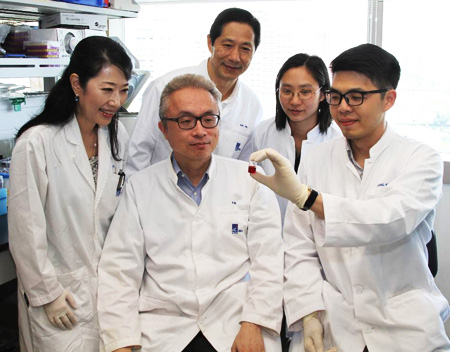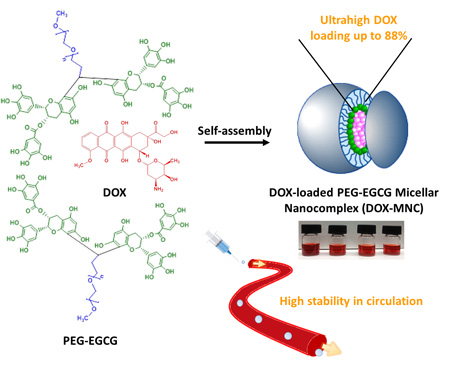A*STAR NEWS
Green tea-based drug carriers improve cancer treatment
Singapore- March 15- 2018 – The Institute of Bioengineering and Nanotechnology (IBN) of A*STAR has reported superior results using new green tea-based nanocarriers to kill liver cancer cells- compared to existing drug delivery systems. IBN Team Leader and Principal Research Scientist- Dr Motoichi Kurisawa- and his group recently published their findings in the scientific journal Advanced Materials.
Researchers working on drug carrier technologies to improve cancer treatment face two key challenges. First- existing carriers used to transport drugs to tumor cells in the body can typically carry only about 10% of their weight in drugs. This means that more carriers are needed to deliver a specific amount of drugs- and patients would require more frequent injections or a larger dosage per treatment to kill cancer cells effectively.
Secondly- current carrier systems are unstable. As they move around in the body- they are easily diluted in the bloodstream or destabilized by plasma proteins. This leads to leakage of the drugs before the carrier reaches its intended target- thus harming healthy cells along the way to the tumor site. These shortcomings of current carrier systems result in less effective therapy and potential toxic side effects for the patients.
In 2014- IBN researchers led by Dr Kurisawa created self-assembling nanocarriers from epigallocatechin-3-O-gallate (EGCG)- a known antioxidant found in green tea- and Herceptin- a breast cancer drug. Those nanocarriers could load and deliver more drugs to the cancer cells- and killed them more effectively than other formulations of the drug (Nature Nanotechnology- 2014). Now- the team has applied the same approach to make new nanocarriers from EGCG and Doxorubicin- which can carry up to 88% of their weight in drugs. Doxorubicin is used to treat a variety of different cancers- such as that of the breast- bladder and liver- as well as leukemia. IBN’s green tea-Doxorubicin nanocarriers were tested in a liver cancer mouse model and displayed superior tumor-killing performance and stability with minimal unwanted toxicity- when compared with two other clinical formulations of Doxorubicin.
“This study corroborates our earlier findings and demonstrates the versatility of our green tea-based carrier system. We are excited about the potential of using our technology as a universal vehicle for delivering other chemotherapeutics to treat different types of cancer-” said IBN Executive Director Professor Jackie Ying.
The uniqueness of IBN’s nanocarrier lies in the strong intermolecular interaction between the structurally similar EGCG and small molecule anti-cancer drugs. This interaction facilitates drug loading and also provides excellent thermodynamic and kinetic stability to the carrier.
According to Dr Kurisawa- “The unprecedented amount of drug loading in our new nanocarriers allows us to kill more liver cancer cells effectively. We are hopeful that our technology would lead to fewer side effects in patients.”
The researchers are now evaluating the loading of other types of drugs in the carrier.
References:
- K. Liang- J. E. Chung- S. J. Gao- N. Yongvongsoontorn and M. Kurisawa- “Highly Augmented Drug Loading and Stability of Micellar Nanocomplexes Composed of Doxorubicin and Poly(ethylene glycol)-Green Tea Catechin Conjugate for Cancer Therapy-” Advanced Materials- (2018) 1706963.
- J. E. Chung- S. Tan- S. J. Gao- N. Yongvongsoontorn- S. H. Kim- J. H. Lee- H. S. Choi- H. Yano- L. Zhuo- M. Kurisawa and J. Y. Ying- “Self-Assembled Micellar Nanocomplexes Comprising Green Tea Catechin Derivatives and Protein Drugs for Cancer Therapy-” Nature Nanotechnology- 9 (2014) 907-912.
Images:
Image 1: The research team at IBN that developed the green tea nanocarriers. Clockwise from right: Dr Kun Liang- Dr Motoichi Kurisawa- Dr Joo Eun Chung- Dr Shu Jun Gao and Dr Nunnarpas Yongvongsoontorn.
Image 2: Structure of IBN’s green tea-drug nanocarrier- which can carry more drugs and are more stable than current drug delivery systems.
About the Institute of Bioengineering and Nanotechnology
The Institute of Bioengineering and Nanotechnology (IBN) is the world’s first bioengineering and nanotechnology research institute. Established in 2003- IBN’s mission is to conduct multidisciplinary research across science- engineering- and medicine for breakthroughs to improve healthcare and quality of life. IBN’s research activities are focused on Nanomedicine- Synthetic Biosystems- Biodevices and Diagnostics- and Green Chemistry and Energy. The Institute has published over 1-320 papers in leading scientific journals- filed over 660 active patents and patent applications on its inventions- and established 12 spin-off companies. To nurture young research talents- IBN runs a Youth Research Program that offers students research attachment opportunities and exposure to biomedical research. For more information on IBN- please visit www.a-star.edu.sg/ibn.
About the Agency for Science- Technology and Research
The Agency for Science- Technology and Research (A*STAR) is Singapore's lead public sector agency that spearheads economic oriented research to advance scientific discovery and develop innovative technology. Through open innovation- we collaborate with our partners in both the public and private sectors to benefit society.
As a Science and Technology Organization- A*STAR bridges the gap between academia and industry. Our research creates economic growth and jobs for Singapore- and enhances lives by contributing to societal benefits such as improving outcomes in healthcare- urban living- and sustainability.
We play a key role in nurturing and developing a diversity of talent and leaders in our Agency and Research Institutes- the wider research community and industry. A*STAR oversees 18 biomedical sciences and physical sciences and engineering research entities primarily located in Biopolis and Fusionopolis. For more information on A*STAR- please visit www.a-star.edu.sg.
Was This Article Helpful ?
A*STAR celebrates International Women's Day

From groundbreaking discoveries to cutting-edge research, our researchers are empowering the next generation of female science, technology, engineering and mathematics (STEM) leaders.
Get inspired by our #WomeninSTEM


